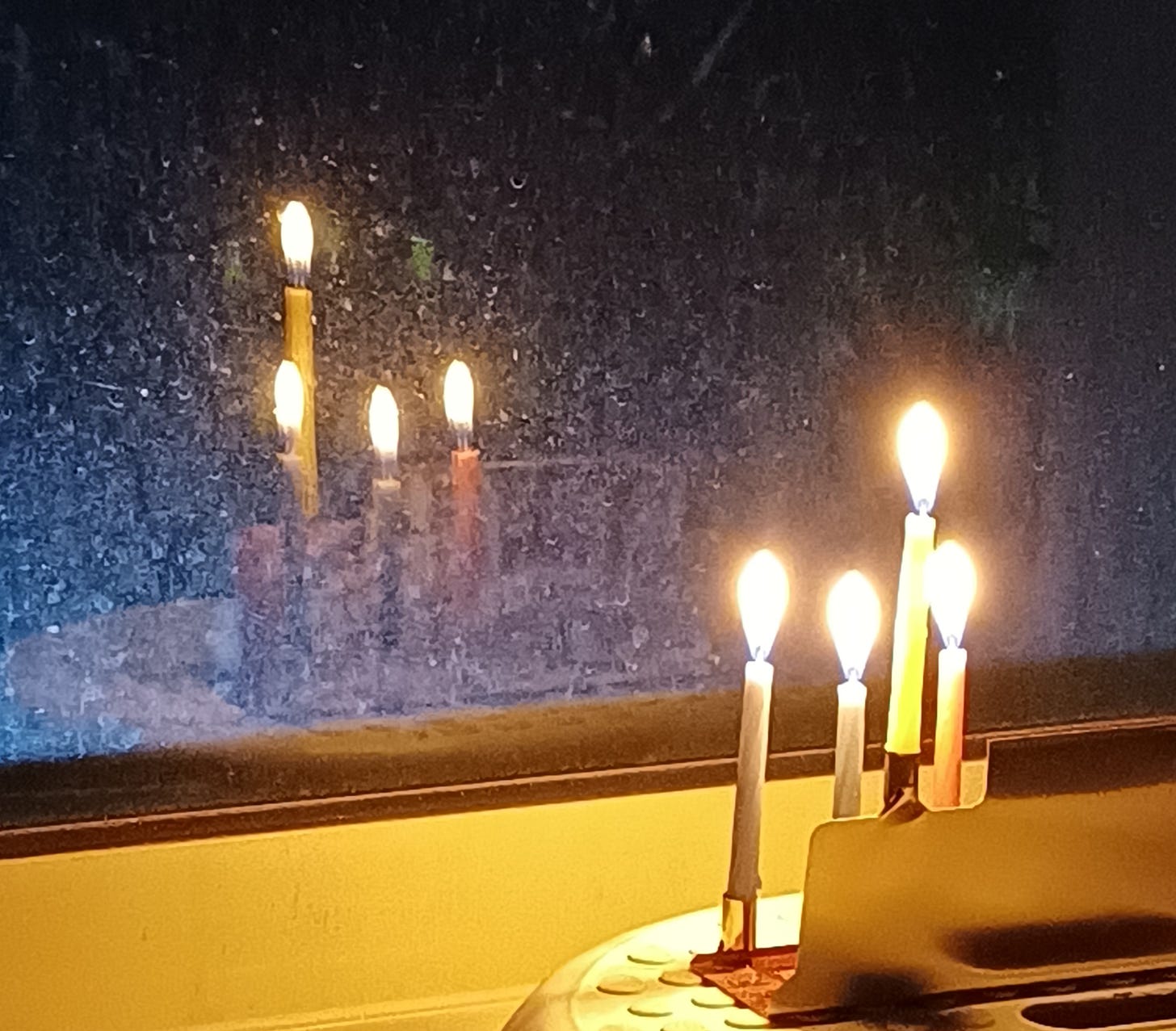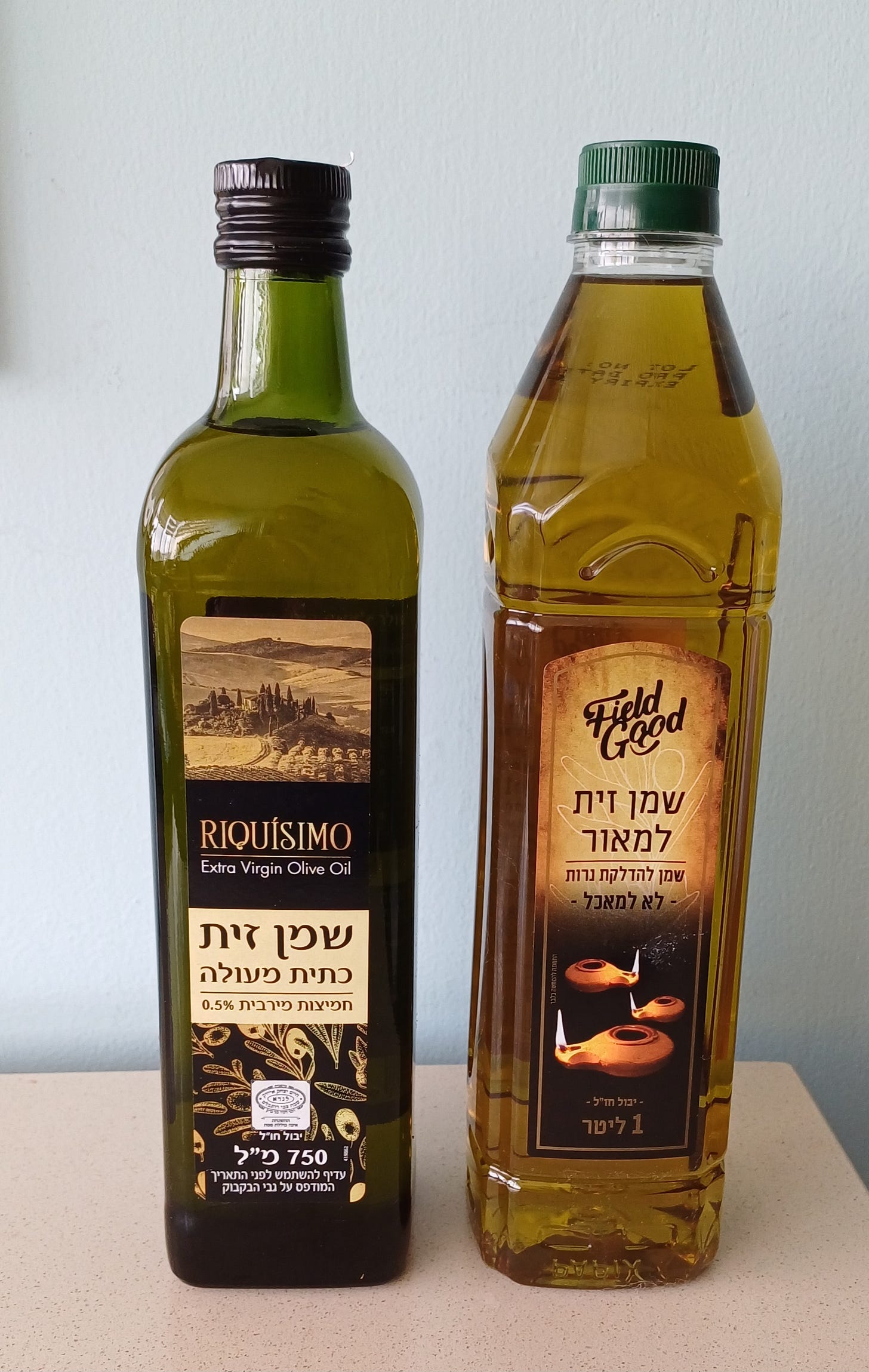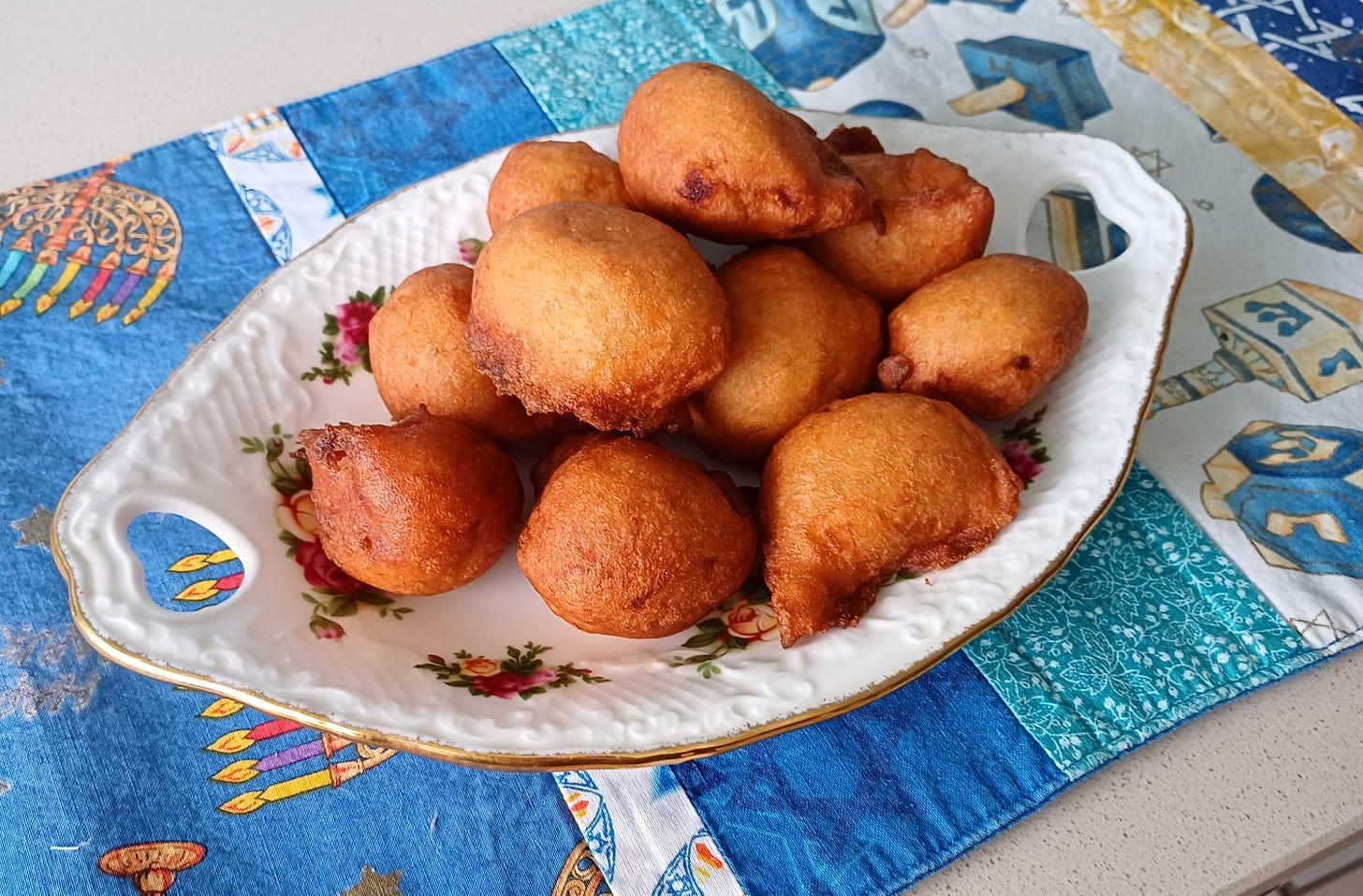Menorah Lights
A Hanukkah story for children ages 8-12. Originally published by Shofar Magazine, November 1997. (c) 1997 by Hanna Bandes Geshelin, revised 2023.
“Why do I have to come?” Jennifer whispered so the other people on the bus wouldn’t hear. “We just saw Grandma. Anyway, that creepy Mrs. Kantrowitz from next door will be there like always.”
“Jennifer, be nice. Since Grandpa died, Grandma really needs us. And Mrs. Kantrowitz doesn’t have any family anymore. Holidays are very tough when you’ve lost people you love.”
“Last Hanukkah we were a real family, and now Dad lives in California.”
“This holiday is hard for all of us: Grandma, and you, and me. For me, too, Jen.”
Jennifer turned to the window. Outside, the sleet had turned to snow. The bus skidded wildly as it turned.
“The ice will be covered by snow,” said Mrs. Rosen. “Walking will be treacherous.”
Jennifer didn’t answer. At least it was starting to look pretty.
The bus skidded to a stop at the shopping mall. The next stop was Grandma’s.
Mrs. Rosen pressed the Stop button. “Careful,” said the driver as she pulled the bus to the curb. “It’s a long walk to the apartments, and very slippery tonight.”
“It does look far tonight, doesn’t it.” Mrs. Rosen looked at the ten identical buildings that rose in a semicircle beyond a long park. In the summer the park was alive with children and adults, but now not another living creature was in sight.
Jennifer took a shopping bag and stepped off the bus ahead of her mother. With a small skid, the bus pulled away. Jennifer started across the deserted park. In the eerie light, the playground looked like ancient ruins.
“We should stay together,” called her mother. “It’s really slippery.”
Jennifer walked faster. I’m nearly a year older than I was when Dad left, she thought, but Mom treats me like I’m younger. Jennifer remembered other Hanukkahs, before Dad left. They’d sung the blessings and songs and laughed as they opened presents together. It wasn’t fair.
Warm from her anger, she soon reached the playground. Still far ahead, the ten apartment buildings faced her like a distant wall. Which was Grandma’s? She didn’t remember. She stopped in the swirling snow, waiting for her mother.
Now she could feel the cold. She stamped her feet and brushed the snow from her coat. Where was Mom? She peered into the snow. Even the boulevard lights were lost in whiteness. “Mom?” Her voice blew back at her. She was completely alone.
She hurried back toward the bus stop, the shopping bag banging against her leg. Suddenly her feet flew out from under her and she landed hard on the pavement. She gasped for breath, the icy air freezing her lungs. From her low angle, she saw something sprawled on the pavement ahead. Could that be her mother? She got to her feet. “Mom?”
The shape moved. “Jen?” Her mother’s voice was weak. “Hurry. Can’t get up.”
Jennifer tested every step now, but reached her mother with no further mishap.
“Help me up,” whispered Mrs. Rosen.
Jennifer stared at her mother’s outstretched leg. “I . . . I think your leg’s broken. Where’s your phone? I’ll call 911.”
“I had it in my hand, but it flew out when I fell. It’s somewhere over there.” She gestured with one hand. “I think it broke.”
Jen looked in the direction her mother had pointed. Smooth snow covered everything. Jen looked all around. Outside of her footsteps, the snow was unbroken.
“I’m going for help.” She took one step forward, then looked back at her mother’s snow-covered hair and thin leather gloves. She’d freeze like that! Jennifer began to remove her own knit cap, then remembered the Hanukkah presents. An afghan and a scarf set might be old-lady gifts, but now they’d really help. She brushed the snow off her mother, then tore the packages open.
She pulled the woolen hat Mom had knitted for Mrs. Kantrowitz over her mother’s head, helped her into the wool gloves, and tucked the scarf around her neck and face. Next she covered her with the afghan for Grandma, tucking it gently around the leg. “I wish I could keep your face off the pavement,” she said, “but...” Noticing the discarded wrappings, she piled them into a pillow and slid it under her mother’s head.
“I’ll be right back,” she said, standing up. Then she knelt back down and kissed her mother.
“Careful,” her mother breathed.
“Don’t worry,” Jennifer replied grimly.
The wind had picked up, and heavy snow swirled. After she slipped and almost fell again, she slowed her pace. Ahead were the buildings. She remembered her grandmother’s apartment was 4-C, but in which building? She should have asked. With her mother lying in the snow, every moment counted.
She lowered her head against the wind and plodded on. “Mom, be all right,” she whispered into the wind. “Please.”
She was past the playground now, close enough to the buildings to see a few menorahs glowing in windows. She moved a little faster, but the blinding, slippery snow made speed impossible. How will I find the right building, she wondered. Does God help people today, the way he did in the Maccabees’ time? “God, if You’re there, help us!” she whispered.
Suddenly she noticed that one Hanukkah menorah was in a fourth-floor window. In her mind she heard Mrs. Kantrowitz say, “Ethel, you light the menorah on the sideboard? I always put mine on the windowsill, so people outside will see it and remember the miracles of Hanukkah.”
Jennifer looked carefully. In all the fourth-floor windows, this was the only menorah. It must belong to Mrs. Kantrowitz. This must be her grandmother’s building. She fastened her eyes on the menorah and kept moving. The light of the candles reeled her in, like a fish on a line.
In the lobby at last, she found her grandmother’s buzzer and pressed hard. As she waited for her grandmother’s voice on the intercom she breathed deeply. Mom was still out in the snow, but soon there’d be help. Soon she’d be with family. And that meant everything.
For Parents, Teachers, and Others
What is Hanukkah about?
Hanukkah, also spelled Chanukah, could almost be considered both a national and a religious holiday for Jews. It is national because it commemorates the victory the Jews won from the Syrian Greeks. These invaders tried to make Jews assimilate to the Greek culture, and had succeeded to some degree. As part of their effort they outlawed the Jewish religion. When they captured the Jewish Temple in Jerusalem—considered God’s home on earth—they used it as a barn, housing pigs in its holiest part. Pigs are considered unclean animals by the Bible (Leviticus 11:7), making this a particularly vile act. The Syrian Greeks were defeated in a guerilla war fought by a group of citizens who became known as Maccabees.
Tante Hanna Writes is a reader-supported publication. To receive new posts and support my work, consider becoming a free or paid subscriber.
Subscribed
The reality that a small number of Jewish fighters chased out a large, well-trained, professional army was a miracle, but there was another miracle as well: the reason this is also a religious holiday.
When the Jews won back the Temple, they wanted to relight the Eternal Light. That required specially purified olive oil, and the invaders had destroyed all the oil. Aha! But not all! One small vial was found, enough for one day. As soon as the Temple was cleaned, the Maccabees lit the lamp anyway; they must have been too excited to wait for the 8 days of the purification process. By another miracle, that little bit of oil burned for the full 8 days, until new oil was available.
God’s hand was clearly shown in these miracles.
Why can Orthodox Jews work and drive on Hanukkah but not on the High Holidays or Passover?
The holidays mentioned in the Five Books of Moses that make up the Jewish Torah are Rosh Hashana (New Year), Yom Kippur (Day of Atonement), Sukkot (Booths), Shemini Atzeret/Simchat Torah (Rejoicing in the Torah), Pesach (Passover), and Shavuoth (Weeks). These days have very special holiness because they were clearly ordained by God and written in His book. Hanukkah and another holiday, Purim, are important but of lesser stature. They commemorate historic events that occurred after the era of the Torah.
What is the Menorah and how is it used?
A special candelabra was lit in the Temple at all times. This is known in English as the Menorah. It had seven branches: three on each side representing the six days of the week, and one in the middle representing the Sabbath. This was the candelabra that was lit by the small vial of oil.
The Hanukkah menorah has nine lights: eight for the eight nights that the oil miraculously lasted, and one, set apart from the others, that is used to kindle the other lights, which is lit every night. On the first night of the holiday one regular light is lit, and another is added each night until, on the last night, all eight are lit.
While most Hanukkah menorahs in the USA burn candles, in Israel and other places many people use oil. Olive oil is preferred, with specially labeled “not for food” oil available. Even if you don’t read Hebrew you can tell from the picture of oil lamps on the label of the bottle on the right that that’s the special lamp oil.
Why is the menorah put in a window?
The Talmud, Jewish wisdom codified between the 3rd and 8th centuries, recommends Jews to publicize the miracles of Hanukkah by drawing attention to the holiday by putting the menorah where it can be seen by passers-by. Many people put it inside, beside the door. In Israel, many people use special wind- and rain-proof boxes so that they can put their menorahs outside.
Do Jews give gifts at Hanukkah?
Jews used to give children a coin on Hanukkah, or one each night in wealthier families, a custom that continues in many places. Some say that the coins represent coins minted by the Maccabees after they won independence from the Syrian-Greeks. Chocolate “coins” wrapped in gold and silver foil are often given.
Because Jewish children in the USA can feel left out at Christmas, it became customary to give larger gifts on Hanukkah. Many American families give their children one gift on each night. However, there is no tradition of giving gifts for Hanukkah.
Is Hanukkah the Jewish Christmas?
Christmas, celebrating the birth of Jesus, is not a Jewish holiday. Jews do not recognize Jesus as divine or even as a prophet. So No, Hanukkah is not a Jewish Christmas. It is a purely Jewish holiday although it commemorates the first fight for religious liberty and as such has importance for freedom-loving people of all religions.
What are the special Hanukkah foods?
Jews eat oily foods to commemorate the miracle of the oil. In Europe and countries containing many Jews whose ancestors lived in Europe, latkes are eaten. These are potato pancakes fried in oil. They are often eaten with sour cream, yogurt, or applesauce.
Jews whose ancestors lived in North Africa and the Near East eat other oily foods. In Israel, sufganiot, donut-like pastries that are also fried in oil, are common. Sometimes these have jam filling like American jelly donuts; sometimes they do not. This author likes making banana fritters, which are easier than jelly donuts and tastier, to her thinking, than regular donuts.
Dairy foods such as yogurt, sour cream, and cheeses, especially salty chesses such as Feta, are often eaten to commemorate the bravery of a woman named Judith. She saved her city by getting the leader of the opposing army drunk and then cutting off his head, demoralizing his troops so that they ran away. She got him drunk by giving him a feast that featured salty cheese, and then gave him strong wine to cure the thirst that was brought on by the cheese. Judith's story can be found here.
What is the dreidel game?
The dreidel, or sivivon (spinner) is a four-sided top with a Hebrew letter on each side. In Israel and outside of Israel the last letter is different. The letters stand for the sentence, A great miracle happened here (in Israel) there (outside of Israel).
For more information on dreidels, see this.
Game rules for Dreidel are here.
About the Story, Menorah Lights
This story is based on traditional Hanukkah stories in which the lights draw someone to safety. One version is of a Russian general, separated from his troops, who got lost in a vast forest. A Russian law forbade lighting the menorah, but one stubborn, devout old man ignored the law. The general saw the lights, followed them, and found safety in the old man’s house. When the old man was going to be punished for his menorah, the general saved him and had the law rescinded.
Another version is of a Jewish farming family living in North Dakota about 100 years ago. The parents had gone to the city to shop, leaving children from preschool to upper teens home alone. A blizzard came up before they got home. The children lit the menorah anyway, and the lights drew the parents safely home through the snow.
I wrote this story because so many Jews today are divorced from Judaism, and I wanted to show that the old traditions still can have relevance today, even for nonreligious people.





